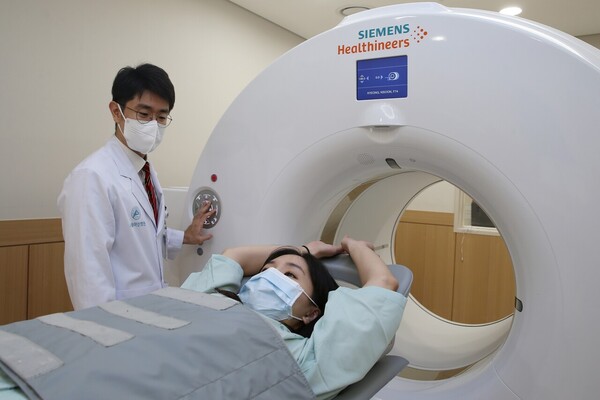An imaging procedure for breast cancer patients developed by medical professionals at Asan Medical Center (AMC) has been listed as a world standard test.

It has become possible to diagnose female hormone receptors in breast cancer patients with difficulty in obtaining a biopsy with only a 15-minute imaging test. Breast cancer treatment varies, depending on the presence of female hormone receptors.
AMC said Monday that the 18F-FES (Fluoroestradiol) positron emission tomography (PET) test developed by its interdisciplinary research team has been announced as the U.S. National Comprehensive Cancer Network (NCCN) guideline. The NCCN is the global leader in cancer treatment standards.
The team was led by Professors Moon Dae-hyuk Han Sang-won of the Department of Nuclear Medicine, Professor Kim Seong-bae of the Department of Oncology, and Professor Lee Jong-won of the Department of Breast Surgery.
Breast cancer positive for female hormones, which accounts for 70 percent of breast cancer patients in Korea, requires anti-hormonal treatment because cancer cells are driven by hormones to grow. If the breast cancer recurs or metastasizes, an additional biopsy is required as the female hormone receptor diagnosis results determine the treatment method. Still, a biopsy can be difficult, depending on the site.
The 18F-FES PET test, developed by the AMC team, can detect metastatic lesions throughout the body with only 15 minutes of imaging. The hospital’s Breast Cancer Center led the development and clinical trials of the 18F-FES PET test to prove its safety and efficacy.
The results of the study were adopted as key evidence by the U.S. Society of Nuclear Medicine and the Korean Society of Nuclear Medicine when they announced the “appropriate use criteria” for 18F-FES PET.
"We are pleased that 18F-FES PET, which has been researched in Korea and proven safe and effective, has been recommended as an NCCN guideline," Professor Moon said. "It will allow patients with recurrent or metastatic breast cancer, for whom biopsy was difficult or impossible, to be diagnosed more safely and accurately for female hormone receptor status and receive the most appropriate treatment."
Moon added that the team would continue to lead global research to improve survival and personalize care for cancer patients.
Professor Kim, also director of the Breast Cancer Center, said that with the advancement of breast cancer diagnostic technologies, such as 18F-FES PET, and the gradual development of treatments, including chemotherapy, anti-hormones, and radiation, we are looking at a five-year survival rate of 95 percent for breast cancer.
"Notably, female hormone receptor-positive breast cancer has a relatively high risk of late recurrence among breast cancers and receptor changes. However, if patients do not lose hope and actively approach treatment, they can achieve good results," Professor Kim added.

